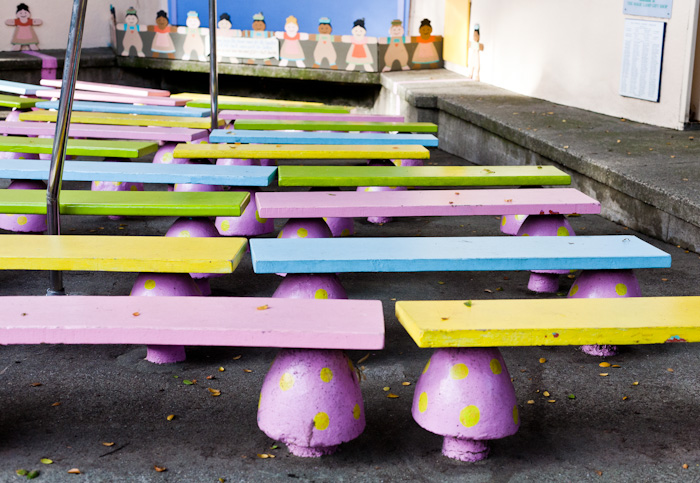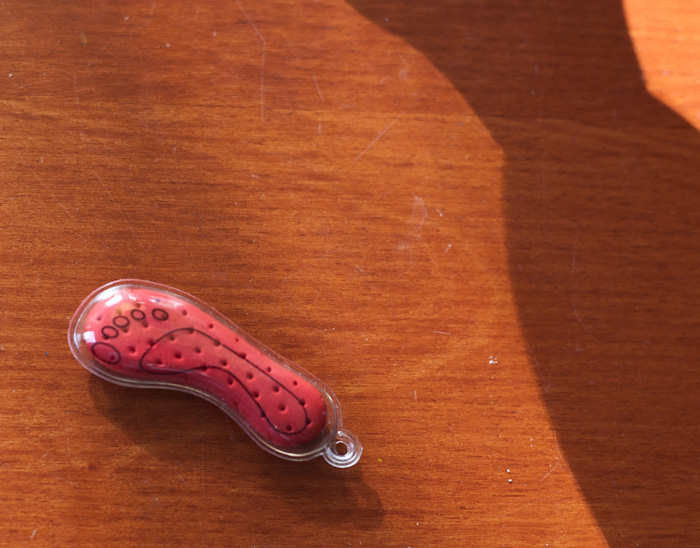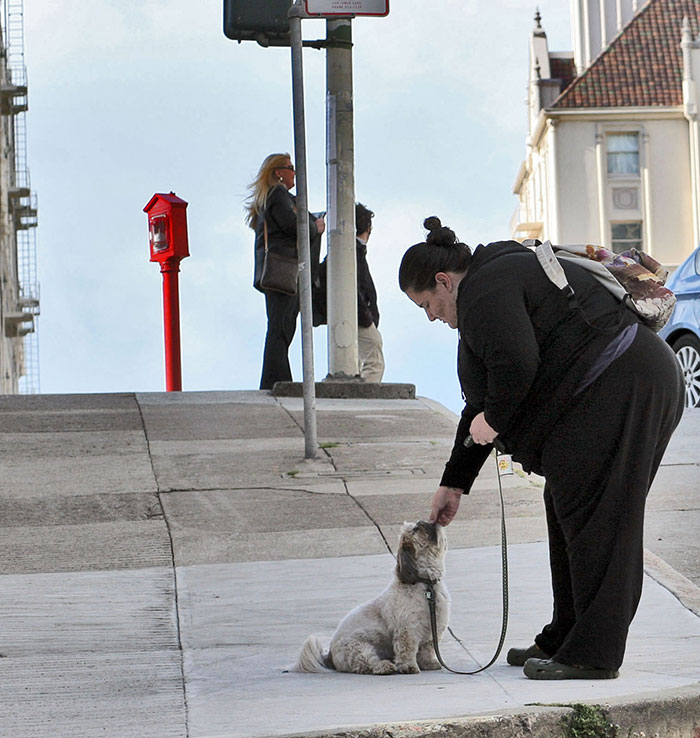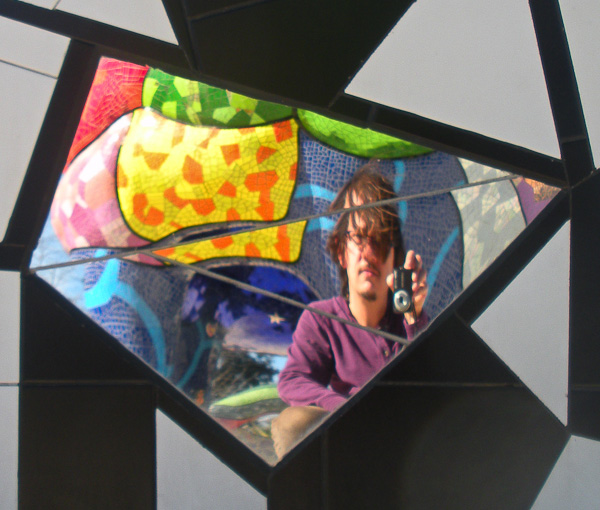
Stuff
by Pepe Rojo

“Hi, Dolly!” the husband shouted, opening the front door.
“Hi, Doll!” the wife answered from the kitchen.
“Where are the kids?” Doll asked, brushing his cheek against hers.
“They’re staying over at the neighbors,” she said, pulling a container out of the microwave and putting it on the table. “How was work?”
“As usual,” the husband replied. “A calculator decided to swap religions and went for the hexadecimal system. Destroyed a week’s worth of work. The experts are working on it. How about you?”
“It was an awful day,” Dolly answered with a smile. “Everything was going well until the paper came. It was written in another language, but the pictures and the cartoons were all right, so I decided not to worry about it. At noon, the fridge had a nervous breakdown, and it defrosted. When I walked in, the kitchen was flooded. I had to mop the floor, sweep it, call the supermarket for more ice, and then call the therapist. He promised to have the fridge back this weekend.”
“Poor thing!” said Doll. “It’s been terribly depressed this year. But it’s been loyal. I hope these days off will suit it well. What’s for dinner?”
“Duck a l’Orange!” Dolly said. “Courtesy of the refrigerator company. You know I don’t like generic food, but they said its nutritional value was guaranteed. And since I was tired, I thought it best not to think too much about dinner.”
Doll carefully opened the container. He took a fork and, cautiously, inserted it into the duck’s breast. He closed his eyes and brought his nose closer to it.
“Smells good,” he said.
“And tastes good, too,” the wife replied. “I had some a while ago. Plus I ran it through the verifier and it came out negative. It’s an approved duck. I think sometimes one must take certain risks, because if we didn’t life would be so boring, don’t you think?”
Doll and Dolly ate the duck and they both agreed it was delicious. Doll picked up the dishes, and Dolly fed them to the dishwasher. Then they went upstairs to the bedroom. Dolly entered the bathroom to change. Her heart stopped when she saw her nightgown. The previous night it had been pink. Now it was red. Dolly blushed for what her husband might think about that. Indecisive, she sat next to the sink and opened a women’s magazine. She closed her eyes, and randomly selected a page. The article, entitled “Why trusting your partner is important,” gave her the necessary courage to put on the red nightgown and go out to the bedroom. She tried to act as natural as possible and hummed the first jingle that came to her mind: the one from a commercial on how the best vegetables are selected and canned, guaranteeing the best quality.
“Is that your new nightgown?” Doll asked “Did you buy it online?”
“Do you like it?” Dolly said, hurrying to get under the covers.
“I sure do,” Doll replied and turned on the TV. They looked at the screen in silence. A commercial came on showing several couples gazing into each other’s eyes.
“Are you thinking what the TV is thinking?” they both said at the same time.
“The kids are away,” Doll said. “Why not?
The red color of the nightgown intensified, and she covered it with the sheets.
“It’s been years since we’ve watched the Sex Channel,” Doll sighed.
He opened the drawer and looked for the password to unlock the channel because, following cable company’s instructions, he had locked it for the sake of the kids.
“Here it is!” Doll said, as he toyed with the remote, pressing numbers and letters according to the instructions.
The Sex Channel was showing a program on how to improve one’s sex life. Doll and Dolly watched in silence. The voice assured them that by following some simple suggestions, exemplified by diagrams, mannequins and actors, sex could improve relationships.
“It’s oh so hot!” Dolly said.
“The blankets again, Dolly,” said Doll. “You know that sometimes they overheat.”
Dolly and Doll watched the TV screen until they fell asleep. The light was automatically turned off. The blankets heated up the room until the cable running the video signal to the TV ejaculated rust on the other end. The VCR moaned, the screen exhaled and then turned off. The humming of the energy regulator was like a lullaby for everyone in the house.
“Is it normal, doctor? Is all this violence normal?”
“What violence?”
“It’s everywhere: on the streets, in every home, in our heads….”
“In your head?”
“Yes….”
“Why don’t we talk about that?”
“I’ve just heard about some refrigerators that… well, I don’t know how to put it. Well…they murder people.”
“How?”
“Children, mainly. They usually do it when they’ve been discarded, when they’re no good anymore. I think it’s some sort of revenge. When they find a kid, they invite him to come inside and hide; they whisper words of love, of peace, of adventure. Then, when the child is inside, they lock him in; they make him stay to keep them company from now until time grows old.”
“And what do you think about this?”
“I can understand why they do it. I can understand what it feels like to be useless; even more, I feel it everyday. Everybody uses me, the house doesn’t work the same without me, but to them I’m just an accessory, and I feel alone, so alone. Sometimes I get mad. Sometimes, when they open me with their dirty hands, when they spill something inside me and everything stinks and I can’t breathe and I can’t stand myself… sometimes, I feel like killing them. But on the other hand, loneliness terrifies me. When there’s no one home, when I can hear the fluids that run through me and the humming of the light bulbs and the sound of everything inside me in slow putrefaction, I feel like I can’t take it anymore. How many years do I have left? Five? Three? In a few months, not even the company that created me will accept me. What’s next? What’s left? This damned boredom, this loneliness that encloses my breathing, this cold. And that’s why I understand those refrigerators. I think that to have life inside of me, even for a moment, a child, a baby inside me, would make everything worth it. It would give me enough memories to go on through the rest of my life. I see children, and I want to keep them. I think it’s in my nature.”
“And you feel so guilty that you defrost. “
“Yes….”
“Had you had any valve control problems before?”

The next day, Dolly went to pick up Doll Face and Baby Doll. When she arrived at her neighbors’ house, the car started to break down. All the other cars parked in the driveway were younger. Dolly gently touched the dashboard, and it agreed to go a little further. When Dolly got out of the car, she noticed that all her accessories, from her shoes to her barrette, were now green. She took a deep breath and rang the bell. Neighbor opened the door. Their cheeks touched, they snapped their lips, and went on, almost at the same time, to how good they looked and how appropriate the color of their outfits was. After Neighbor politely called out to the kids, to let them know that they were being picked up, she and Dolly sat down in the kitchen to talk about their problems. Dolly told her about the fridge, and Neighbor tried to balance things out, explaining that her stove had manic attacks, and that every time she tried to cook something, the oven would burn it.
Doll Face appeared at the kitchen door, along with Neighbor’s kids.
“Hello, Mother!” he told Dolly, who brushed her cheek against his.
“Something weird happened to Baby Doll.”
The color of both women’s dresses darkened a few shades.
“And where is she?” Neighbor said.
“Out here,” one of her children replied.
They left the kitchen, and Dolly found Baby Doll, sitting with her back to her.
“Hello, darling! What’s wrong?”
She turned to Dolly, and everyone’s jaw dropped. Baby Doll had grown a beard.
Dolly, Baby Doll, and Doll Face got home, left their things in the closet, and went upstairs to Dolly’s room. As soon as the last of their steps was heard, the entire first floor burst into laughter. The desk lamps bent over giggling. The vases were tearing up; the flowers were losing its petals. The couch cushions were opening up and closing down again. Even the vacuum cleaner started choking on its own dust.
When the phone rang, the desk drawer made its best attempt to close on Doll’s fingers. It had been very mad for several days now. It didn’t know exactly why or since when, but it felt an overwhelming hatred, especially when someone came near and placed their hands upon it, or when Doll nervously tapped his foot and kicked it. And the weight of the computer and the office supplies were just like a knife plunged into its back.
“Good afternoon!” Doll answered.
“Hi, Doll! How are you?” Dolly said from home.
“What a surprise, Dolly!” exclaimed Doll, and they exchanged kisses over the telephone. With no apparent reason, the stapler snapped its teeth.
“You won’t believe this” Dolly said. “We’ve had a little inconvenience today.
“What happened?” Doll asked.
“Baby Doll grew a beard.”
Doll stayed silent. His computer screen displayed: Command not found.
“What…?” Doll asked.
“Yes, I went to Neighbor’s to pick her up. and when I got there, she had a beard! It’s dark brown with some highlights. But she says it doesn’t hurt, it just itches a bit.”
“And how is she?” Doll asked.
“Oh, very well!” Dolly replied. “She’s upstairs playing with Doll Face. We were really lucky, she is such a beauty… but I don’t know what to do about this beard thing.”
“I think you should take her to a hormone technician “ said Doll “Surely it will go away with some pills or shots.”
“Thank you, Doll,” his wife said “I don’t know what I would do without you.”
Doll and Dolly snapped their lips and said goodbye. Doll heard a strange noise coming from the printing room. He got up to investigate. His desk stuck out one leg and tried to make him stumble. Doll walked past his boss’ office, and looked inside.
The boss wasn’t passing through a good moment in his life. A few weeks ago, at home, he had let some street kids play with his dishwasher for a moment, and now the residents of his luxury neighborhood, who had seen the once-dirty kids come out clean, had warned him that they would not stand for that type of behavior. The office window was foggy and had a couple of grease stains here and there. The desk seemed to collapse under the pressure of everything it was carrying. The desk light flickered. The books leaned on the bookshelves.

Doll continued on his way and opened the door to the printing room.
Inside, dozens of papers flew in the air. It seemed that, once more, the air conditioning was having hyperactivity issues. The machines spat one page after the other. All the same, some in color, some black and white. Endlessly. Doll tried some of their buttons, but they refused to obey and stop printing. The papers were flying out of the room, and people around the office were looking up, concerned.
Doll recalled that Maintenance had promised the printers an aromatherapy session weeks ago. As usual, Maintenance had not kept their word. Doll got on his knees and stretched his arm around the back of a particularly active machine until he found the plug. He pulled it. All the papers floated, lazily, until resting on the floor.
Doll picked one up. The printout revealed pieces of several bills. Doll dropped it on the floor and went back to his desk to call Maintenance.
Had he been more careful, he would have noticed that between the bills, in very soft lines, the word “help” could be read in every page.
The hormone technician came to their home. He was wearing overalls and showed, with a smile, credentials in which every relevant organization credited him as a responsible and qualified person. Dolly took him to Baby Doll’s room. She was in bed and looked at every object in her room with some suspicion. The technician smiled. His briefcase made some very strange sounds. The technician put it on the floor and kicked it.
“Hello, Baby Doll! Your mom tells me you haven’t felt very well.”
Baby Doll nodded.
“Don’t worry! I’m going to run some tests, and you’ll be as good as new.”
The technician came closer to Baby Doll and asked her to close her eyes. He opened the briefcase, which hadn’t stopped making odd sounds, and took out some tweezers. He pulled out one of the hairs from her beard. Baby Doll yelped. The technician carefully examined it.
“When was her last check up?” he asked Dolly, as Baby Doll tried to peek inside the briefcase, which was getting louder. The technician closed it with a kick.
“A year ago. The prevention technician gave her a few shots.”
The technician asked Dolly a couple of more questions, taking Baby Doll’s pulse as she maneuvered to get closer to the briefcase. Inside, several tools moved and clashed nervously against each other. The stethoscope tried to move over a tiny hammer, as the suction pads stuck to the briefcase sides and slowly climbed up. A few packed needles tried to pull them down.
The technician examined Baby Doll. Tested her reflexes. Took her heart rate and measured her lung capacity. He drew some blood. Asked her for urine and stool samples. Gave her a resistance test. Checked her pulse again. Wrote everything down.
The technician said goodbye to Baby Doll.

“I think I’m ready to go back. I feel a bit better. I think what I have to do is just stop thinking. If I think too much, everything gets confusing. Everything becomes dirty and sterile. And then comes the melancholy. I have to stop thinking and start doing. I have to focus on those things that please me. I have to find the little things that I like. I have to realize that I belong to something bigger and that I play a role in it. That I am important. That I guarantee food preservation in the house. I can’t be this selfish. And yes, it is very clear that someday no one will need me. But, what good is it to worry about that today? I have to live the moment. The future will come. When it does, I’ll deal with it. Maybe nothing makes sense, maybe things work because they do and there’s nothing more to it. Maybe trying to find a reason for everything is just a waste of time. I have to stop thinking and do the things that make me happy.”
(Silence)
“Doctor, I think I’m ready to go back.
At night, while everyone is sleeping…
The fish tank envies the floor lamp’s poise. The water temperature increases a few degrees, and kills the fish inside it. The couch protests against the chair for being insolent. The rocking chair talks dirty to the tablecloth, which at the same time, whispers a pious prayer. The doormat, now a Marxist, tries to explain to a vase how it is being exploited by the system. The light bulbs of the ceiling lamp publicly declare the individual a failed project and pronounce collective intelligence as the future, turning off and on in rhythm. The dining table makes its wood agonize in terrible laments. The chairs, inch by inch, struggle to get away. The china puts up with the plastic dishware. The forks want to be spoons. The stove wishes for the dishwasher’s lifestyle. The sink dreams of being a stereo. The speakers would rather be a monitor. The monitors, a painting. The painting, a wooden floor. The wine cellar, Tupperware. The dust, air. The air, a desk. The honey, blood.
Baby Doll hears the whispers and movement downstairs. She gets up and tries to listen. She can’t make out the words, but their sound makes her heart shrink. She tiptoes to Doll Face and sees he is sound asleep. She thinks she might get a better night’s sleep in her parents’ bedroom, but puts her hand to her beard and thinks twice. “I’m a big girl, now.” Quietly, she goes down the stairs and watches the furniture move. She listens to parts of their conversations. The lowest step of the staircase gives an alarm signal, and everyone on the first floor shuts up. They discretely turn to see Baby Doll. She slowly comes closer and lies down on the couch. She sucks her thumb and feels something wet in her eyes. The couch lulls her to sleep.
Baby Doll cries, cries and cries, until she falls asleep. The furniture stays silent.

Dolly wakes up and thinks that it’ll be a nice day since the sun is hitting the room in the most unusual way. She looks at her watch and realizes that it is very, very late. She gets up and shakes Doll by the shoulder.
“Doll! Wake up! It’s very late!” Dolly says urgently.
“What’s going on?” Doll muttered.
“I don’t know” Dolly says as she picks up the alarm clock. “The clock stopped at 3 a.m.”
“Another therapy bill for the clock,” says Doll before getting into the shower. “At least they’re tax deductible.”
Dolly quickly goes down the stairs to prepare Doll’s breakfast. She walks past the living room, and doesn’t notice Baby Doll asleep on the couch. In the kitchen, she turns on the radio. Something about a multiple car crash comes on. Dolly turns it off. She hurriedly pulls together the ingredients for a sandwich, and the knife, made nervous by the haste, cuts her finger. Dolly sucks the blood and puts on a band-aid, which takes a long time to adhere. The doorbell rings. She runs toward the door, and then she sees Baby Doll sleeping on the couch.
“Hey there, Baby Doll!” she says, shaking her to wake her up. “What are you doing here?
The bell rings again, and Dolly doesn’t wait for an answer. She runs to the door, and opens it, holding the front of her robe together with one hand. Outside, at the door, is the assistant therapist.
“We have brought your refrigerator, Madam.”
“That’s great!” Dolly says. “What was wrong with it?”
“Just mild depression and work-related stress,” the assistant replies. “Nothing we couldn’t fix. Shall we install it?”
“Of course!” Dolly says. “Come in.”
Dolly takes them into the kitchen, and she finds a note on the floor reminding her she had a date with some friends. If the fridge hadn’t broken down, the note would be on its door, and she wouldn’t have forgotten about it. Dolly decides it’s not worth it to dwell on mistakes and get mad about them; it’s more important to think of the nice things in life.
Doll comes down the stairs and bumps into Dolly coming up to her room.
“Hi, Dolly,” Doll says “How are you?”
“O.K.” she answers and puts her cheek close to his face, expecting a kiss.
Doll softly brushes his cheek against hers. She feels his beard. His briefcase, shaken, drops a few papers.
“Don’t worry, everything’s going to be fine,” he tells her, running for the door.
Dolly stands by the door with a sandwich, coffee, and orange juice. Their cheeks touch once more as she wishes him a good day at the office.
Dolly goes upstairs to shower. The water can’t seem to thaw the chill in her bones. She dries herself quickly, and as she gets dressed, she decides to buy more make-up. The stuff she has now has lost its quality, and it doesn’t bring her cheeks and eyes to life as it used to. Dolly comes down the stairs, and before closing the door, she trips on the doormat, which has rolled itself up a bit. She thinks she has forgotten something, but she can’t remember what.
Dolly walks to her car, thinking of the morning chaos she just went through. Proudly, she gets into the car. Even with all her problems, she never stopped smiling; not for a moment.
Baby Doll feels funny. She doesn’t feel sick. She feels there’s something missing in her chest. Or perhaps something that doesn’t quite fit in it anymore. Every time she gets distracted, tiny drops of some clear liquid come out of the corner of her eyes. She peeks into Doll Face’s room and finds him reading some books. In the drawings, the characters laugh, fall in love, cry and fight. Doll Face only smiles.
Baby Doll goes down the stairs. She goes into the kitchen, and a smile appears on her face. It had been a long time since she’d seen Refrigerator. She opens the door to pour herself some orange juice. When the cold strikes her body, Baby Doll understands Refrigerator. She understands why they had to take him. She understands why it feels alone and why life seems so unbearable and why there’s nothing else for him to expect from this world but loneliness. Baby Doll gets very pale and takes a couple of steps back, still looking inside the appliance.
The touch of Baby Doll’s skin brings a chill to the structure of Refrigerator. Several drops condense in his ducts and immediately freeze up again. A gust of hot air warms its internal temperature. A tremendous urge to defrost takes over him.
Refrigerator has a professional crisis. He knows that what it’s thinking is very unethical. It’s exactly what the therapist prohibited. It means ruining his life and making the future immediately present, in just a few hours.
“Do you feel alone?” Baby Doll asks.
Refrigerator answers that he does.
“So do I,” Baby Doll says, scratching her head.
Baby Doll takes a deep breath and starts taking out the food that Dolly had put inside the refrigerator just a few minutes ago.
“Are you sure?” Refrigerator asks.
Baby Doll nods as she pulls out the shelves and unplugs it. She pats her beard and laughs. She caresses the door and climbs into the belly of the refrigerator.
“Thank you, Baby Doll,” Refrigerator tells her.
“Call me Adriana,” Baby Doll tells him, as she closes the door.
About the Author

Pepe Rojo has published four books and more than 200 short stories, essays, and articles dealing with fiction, media and contemporary culture. With Deyanira Torres and Bernardo Fernández, he co-founded Pellejo/Molleja, an indie publishing firm, where he edited Sub (sub-genre literature), Número X (media culture) and Pulpo Comics (a Mexican-sf comics anthology). With Torres, he co-produced and co-directed a series of interventions called “You don’t exist,” as well as the video installations “Psicopanoramas”. He produced two interactive stories (Masq and Club Ciel) for Alteraction, and published two collections of Minibúks (Mexican SF and Counter-versions) at UABC, as well as the graphic intervention “Philosophical Dictionary of Tijuana”. Right now, he is going crazy producing a series of sf-based interventions to be held at the Tijuana-San Ysidro border crossing, called “You can see the Future from Here,” with students from UABC, where he also works as a faculty member. He lives in strange Tijuana with a strange wife and two strange kids, and by strange, he, of course, means “lovely in an endearing and unusual kind of way”.
Post a comment on this story!